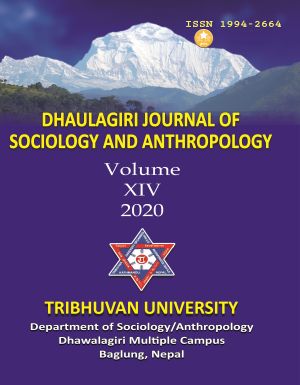Changing Nature of Power and Leadership: How do They Matter in Rural Nepal?
DOI:
https://doi.org/10.3126/dsaj.v14i0.30545Keywords:
leadership; Nepal; power relation, ruralAbstract
Globally, power and leadership are considered as two unavoidable factors of social change and local development. In Nepal’s federal context, the nexus of power and leadership has been less addressed in academic research though most of the studies are focused on local governance. The present study attempts to analyze the nature of leadership and its power structure in the context of rural Nepal. It follows a critical ontological position of the development of power and leadership. Methodologically, a complete leadership of Dogana village in Suddhodhan Rural Municipality of Rupandehi district (Lumbini Province) was undertaken to assess the rural leadership. It is found that the most important factor for holding the rural leadership was ‘affiliation with the political party’, which was followed by ‘well-being ranking’ and ‘caste/ ethnic status’ of the leadership. The rural leaders used to change their policies and strategies to create and sustain power, such as doing multiple professions and building networks other than politics. The paper, therefore, concludes that a significant change occurred in leadership pattern and power structure of rural Nepal from informal to formal, and less inclusive to more inclusive and representative. Despite this, the changes are still elite-centric, politically vested, and economically favorable either to the upper-class people or middle-class mediators (bichauliyas). The study predicts that the contestations in leadership and power-sharing could be more critical in the days to come with the implementation of federalism in the rural context. The implication of this study largely relies on the context of local power structure and village politics in Nepal.




